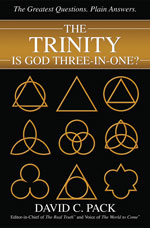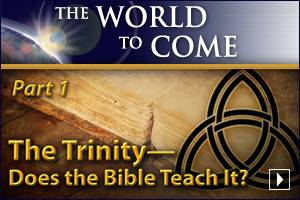In this verse, the Apostle Paul wrote, “Wherefore, my brethren, you also are become dead to the Law by the body of Christ; that you should be married to another, even to Him who is raised from the dead, that we should bring forth fruit unto God.”
Many cite this scripture to prove that the Law of God is no longer in effect. It is important to note that Paul stated, “You…are become dead” (Romans 7:4, Old King James Version). He did not say, “The Law is dead.” Christ’s sacrifice did not do away with God’s Law. Rather, by the acceptance of His sacrifice (repentance—leading to baptism and the receiving of the Holy Spirit) as the payment of the death penalty for their sins, the people had become dead to the Law. (Notice Galatians 2:20.)
Now notice Romans 7:5: “For when we were in the flesh [before conversion, and while we lived according to the pulls of the flesh, and the influence of Satan and the world], the motions of sins, which were by the Law [notice verse 7], did work in our members to bring forth fruit unto death.” While we were sinners, not having God’s Holy Spirit, we were only worthy of death, having broken His Law (Rom. 3:23).
In verse 6, Paul writes, “But now we have been delivered from the [certain death penalty of the] Law, having died to what we were held by, so that we should serve in the newness of the Spirit and not in the oldness of the letter” (New King James).
Keeping the Law does not save anyone. Christ’s sacrifice did that. But Paul, whom most churches love to quote as the source of their belief that the Law is done away, wrote, “What shall we say then? Is the law sin? God forbid. No, I had not known sin, but by the law [analogy: A driver would not know that he is breaking the speed limit if the speed limit were not clearly posted. He might be pardoned in that case. But, once a speed limit sign is visibly posted, there would be no excuse for future speeding]: for I had not known lust, except the law had said, You shall not covet” (Rom. 7:7). And although merely adhering to the speed limit does not save a person from the possibility of having an accident, the law still requires him to travel at or below that speed (“To him that knows to do good, and does it not, to him it is sin” (James 4:17). In addition, if Christ’s sacrifice did away with the Law, there would be no such thing as sin. If that were the case, then, aside from the gospel accounts, why should the term “sin” even appear in the New Testament?
Christ Himself stated, “I have come not to destroy, but to fulfill.” How is it then that anyone, Paul included, could even have the authority to come along and say that the Law is void? Picture the following scenario:
A person is brought to trial for committing every hideous crime imaginable. These crimes were each witnessed by hundreds of people, each having testified to the person’s guilt. Not only that, but there is more than sufficient forensic evidence to convict the person of the crimes. The loopholes and red tape of today’s legal system notwithstanding, the person is guilty beyond all shadow of reasonable doubt. He deserves the death penalty.
But the judge, knowing that the person is legitimately sorry for, and repentant of, the acts he has committed, decides to pardon him. However, the justice system demands that someone pay the penalty for his crimes. The judge’s own son, who has never broken a single law, never even imagined it, volunteers to be executed in the person’s place. The judge agrees with this decision. He poses the “deal” to the condemned individual, stipulating to him the one condition of his undeserved, complete and total pardon:
“From this day forward, you have…absolute freedom and license to do whatever you want—to break any law, or at least and especially those that you feel are unfair or unjust, or inapplicable to you personally. My son has done nothing, absolutely nothing, to deserve to die, and has freely volunteered to die in your place. You are therefore…relieved of any responsibility to keep any law. You may lie, cheat, steal, murder, rape, and do anything that any specific situation in which you find yourself would deem necessary, comfortable, or convenient. You have the right to disregard, and even prosecute, any and all who would have the audacity to tell you that your actions are wrong (in either an illegal or immoral sense) or that you should be expected to live your life in any dissimilar fashion from that previously practiced. If you choose to accept the terms heretofore set forth, you have my complete and unconditional blessing. Court dismissed.”
While most professing Christians (and even individuals who are non-religious) would find the above scenario absurd, it is the very way in which they view God’s Law—that Christ’s sacrifice eliminated the need for obedience to it.
In no way does Romans 7:4-6 prove that God’s Law is void. There, Paul merely points out that by dying for us, Christ paid the penalty of the Law for us. And, as Romans 6:3-4 shows, we are dead with Him. (Again notice Galatians 2:20.) As Romans 8:1 shows, we are no longer condemned, because, through Christ’s Resurrection, we are also made spiritually alive (6:4-5, 11).


















